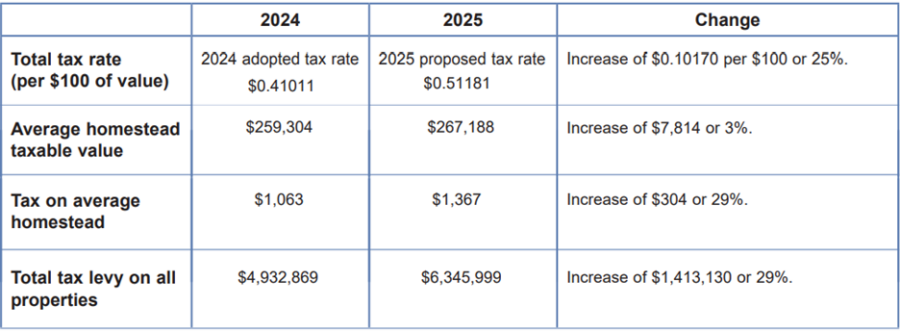Most cities, counties, and school districts are right now in the process of adopting budgets and determining tax rates for the next fiscal year. In some cases, these local decisions will increase the cost of government and put upward pressure on property tax bills. In a few cases, local government action will cause tax bills to soar.
Given the very real prospect of near-term tax increases, now is the time for Texans to learn what’s happening in their communities and get involved in the decision-making process—while there’s still time. Doing so could mean the difference between being able to afford your home or getting priced out.
To better illustrate what may be at stake, consider the city of Canyon.
According to its newly-published Notice of Public Hearing on Tax Increase, the average Canyon homeowner’s tax bill could soon rise by 29%, or an additional $304 per year. Should local elected officials adopt the proposed tax rate, then the city’s total tax burden will grow from $1,063 to $1,367 annually.
One reason for such a heightened increase is that Canyon city officials are considering imposing a much higher tax rate while at the same time property values are growing.
For 2025-26, officials have proposed increasing the tax rate from $0.41011 per $100 of value to $0.51181 per $100 of value, representing a growth of 25%. Meanwhile, the average homestead’s taxable value is expected to rise by 3%. The combination of these two factors—higher rates, higher values—will force tax bills up.

Of course, there is no requirement that Canyon officials adopt the proposed tax rate. In fact, there is a better, friendlier option available for officials to consider, which is the no-new-revenue (NNR) tax rate. The NNR rate is the tax rate that would effectively hold tax receipts constant and “giv[e] homeowners and businesses a chance to catch their breath.” For FY 2026, the NNR rate ($0.3942 per $100 of value) is considerably less than the proposed tax rate ($0.51181 per $100 of value), with the difference equating to almost 12-cents.
Tax-weary Texans will be able to voice their concerns at an upcoming formal hearing. Per the city’s public notice, the date, time, and location are listed below.











